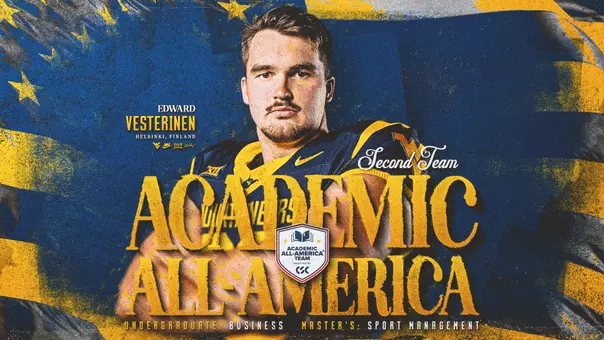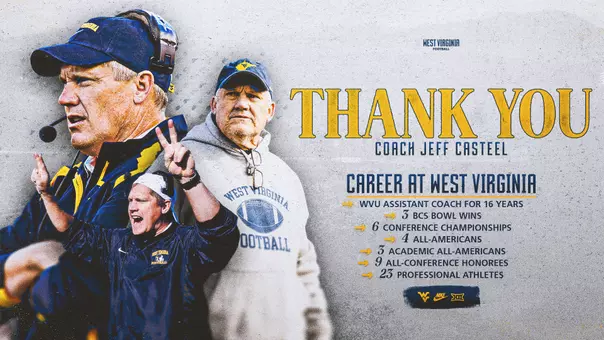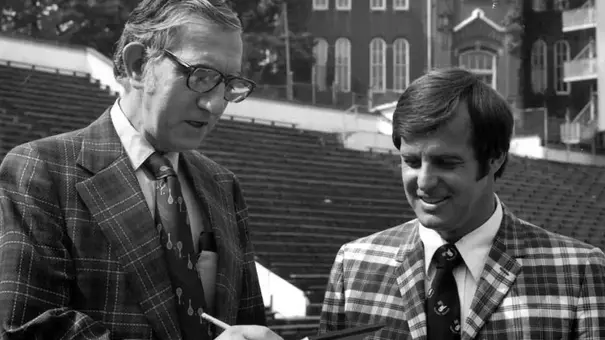Photo by: WVU Athletic Communications
Legendary WVU QB Fred Wyant Passes Away
March 20, 2021 03:31 PM | Football
MORGANTOWN, W.Va. – One of West Virginia University's all-time winningest quarterbacks has died. Fred Wyant, who played on outstanding Mountaineer teams in 1952, 1953, 1954 and 1955 that won 31 games, died earlier this afternoon following months of decling health.
Wyant was a father, grandfather, poet, author, businessman, motivational speaker, athlete and NFL official during his remarkable life.
He was born April 26, 1934 in Weston, West Virginia, and was a three-sport star in football, baseball and basketball at Weston High. During Wyant's senior season in 1951, his high school team won just two games, and he had only two scholarship offers to play college football – one to West Virginia Wesleyan and the other to West Virginia University.
"The people in Weston used to say, 'Well at least when he throws the ball; he can't catch it,'" Wyant once recalled in 2010. "They didn't know the coach was telling me to do this. In the last game of my senior year he said, 'Look, it's your last game and if you don't want anybody else to carry the ball and you want to carry it on every play go ahead and do it.' So I did."
While others saw a pudgy, 5-foot-11-inch, 195-pounder who looked more like a fullback than a quarterback, West Virginia coach Art Lewis saw the perfect player to run his Split-T offense. Wyant had all of the qualities Lewis admired most in a football player – intelligence, athleticism, dedication, self-confidence and, most importantly, toughness.
If you weren't tough you simply couldn't play for Pappy Lewis.
All of this became apparent to everyone in the first WVU game Wyant ever played as a freshman in 1952 – a 22-14 loss to Furman. The Mountaineers were trailing 22-0 early in the fourth quarter when Lewis decided to put his precocious freshman into the game.
 Three unsuccessful plays required West Virginia to punt the ball back to Furman and Lewis was motioning to Wyant to do so from the sidelines. But Wyant went back into the huddle and said to his teammates, all of them much older than him, "I don't know about you guys, but I don't want to kick the ball. Let's go for it!"
Three unsuccessful plays required West Virginia to punt the ball back to Furman and Lewis was motioning to Wyant to do so from the sidelines. But Wyant went back into the huddle and said to his teammates, all of them much older than him, "I don't know about you guys, but I don't want to kick the ball. Let's go for it!"
His teammates didn't want to kick it either, but they were prepared to throw Wyant under the bus if the play he picked didn't work. Wyant called for a long pass to Jack Stone, who caught the ball in stride for a 55-yard touchdown.
He led the team to another fourth-quarter score before time ran out.
West Virginia may have suffered an embarrassing loss to Furman in the '52 season opener, but it had found its quarterback. Four weeks later, on Saturday, Oct. 25, it all came together when Wyant led West Virginia to a stunning 16-0 upset victory over 18th-ranked Pitt at Pitt Stadium.
It was the first time in school history the Mountaineers had ever defeated a nationally ranked team. An iconic picture of Lewis kissing his freshman quarterback on the forehead was snapped by Pittsburgh Sun-Telegraph photographer Morris Berman after the game.
"This is where it all started," Wyant recalled.
By the end of the season, Wyant had full control of the Mountaineer offense, leading them to impressive wins over Virginia Tech and South Carolina.
"I'd call my own plays," he said. "I remember once going over toward the sideline and we're driving down the field at the end of the game against South Carolina, and I said, 'Coach, is there anything you want called?' He said, 'Nope, you're doing great!'"
In 1953, Wyant led West Virginia to an 8-1 record that included big triumphs over Pitt, Penn State and Virginia Tech. A six-point home loss to South Carolina was all that separated West Virginia from an undefeated regular season record.
WVU had risen to No. 5 in the polls before the South Carolina defeat, and a convincing victory over N.C. State in Raleigh in the regular season finale was needed to impress the Sugar Bowl selection committee.
Wyant delivered a 61-0 laugher over the Wolfpack that got West Virginia into the Sugar Bowl for its first major bowl appearance in school history. Years later, when Don Nehlen was reviving West Virginia's football fortunes in the early 1980s with bowl wins over Florida in the Peach, over Kentucky in the Hall of Fame and over TCU in the Bluebonnet, Wyant would unapologetically remind Mountaineer supporters at alumni functions that those bowl wins were fantastic, but not quite the same as playing in the Sugar Bowl.
It wasn't until 1988 when Nehlen's team went undefeated and played top-ranked Notre Dame in the Fiesta Bowl that a Mountaineer team matched the success West Virginia enjoyed during Wyant's sophomore season in 1953.
The quarterback led WVU to an 8-1 record in 1954, its lone setback was a three-point home loss to Pitt that cost it a chance to return to a major bowl game that season. The Panthers also dashed West Virginia's hopes of returning to a major bowl game in 1955 when they defeated the sixth-ranked Mountaineers 26-7 in Pittsburgh.
Wyant hurt his knee on a quarterback sneak early in the second half, and WVU also suffered a 20-13 loss to Jim Brown-led Syracuse the following week to finish 8-2 that season.
Counting the games he started, West Virginia was 30-4 during Wyant's four-year career, including a remarkable three straight victories over Penn State. Wyant was at his very best in West Virginia's 19-14 comeback victory over the Nittany Lions in Beaver Stadium in 1954.
Trailing 14-6 heading into the fourth quarter, Wyant scored a 15-yard touchdown run to pull the Mountaineers to within two. Then, late in the game, he executed the option to perfection by pitching the ball to Dick Nicholson at the last moment, allowing Nicholson to rumble 40 yards for the game-winning score.
Only Pat White enjoyed more success than Wyant as a West Virginia University quarterback. Wyant said he was a big fan of White when he was leading the Mountaineers to big bowl victories over Georgia in the 2006 Sugar and Oklahoma in the 2008 Fiesta bowls.
"They (ran) the option a little bit different than I did," Wyant once recalled. "I could run the option they run now, but the difference (was) he's a flyer. He can really go.
"When I played, we had six or seven guys that maybe gained between 150 to 300 yards, and we all alternated," he said. "I always figured in (White's) case he's almost got to gain himself a minimum of 200 yards for them to have a chance to win. I knew that all I had to do was to be able to gain, passing and running, about 100 yards, and I knew we would win."
Wyant played with some of the greatest names in Mountaineer football history - Sam Huff, Bruce Bosley, Chuck Howley, Joe Marconi, Gene Lamone, Bob Orders and Bobby Moss … but it was Wyant who was considered the straw that stirred the drink.
West Virginia's great success in the mid-1950s doesn't happen without Fred Wyant under center.
He was named N.E.A. News Service "Freshman of the Year" in 1952 and was a three-time All-Southern Conference choice. He received honorable mention All-America honors in 1954 and was a three-time academic All-American.
He accounted for 41 touchdowns and 3,418 yards from scrimmage during his four-year career. A two-platoon player, Wyant also played linebacker and safety on defense. He was picked to play in the North-South and Hula Bowl all-star games following his senior season and played one year in the Canadian Football League in Toronto.
"I didn't like Canada," Wyant once said. "When I came back home after the 1956 season, I was offered an insurance job, and I accepted."
 Not only did his insurance business thrive in Morgantown, but he also owned and operated a successful tennis and racquet club in Westover for many years bearing his name. His officiating career began in 1958 at the high school level and by the early 1960s, he was working major college games.
Not only did his insurance business thrive in Morgantown, but he also owned and operated a successful tennis and racquet club in Westover for many years bearing his name. His officiating career began in 1958 at the high school level and by the early 1960s, he was working major college games.
Wyant became an NFL referee in 1966 and officiated professional games for 27 seasons until his retirement in 1992. Among the famous games Wyant worked was the 1981 AFC Divisional playoffs when San Diego upset Miami in overtime to reach the AFC championships against Cincinnati.
In 2001, Wyant collaborated with former WVU sports information director Rene A. Henry on a book titled "Offsides!" detailing his experiences as an NFL official. He also served as a football analyst on MSN television broadcasts that aired statewide during the mid-1980s.
Wyant was elected to the West Virginia Sports Hall of Fame in 1984 and the West Virginia University Sports Hall of Fame in 1994.
For many years, he served on the WVU Sports Hall of Fame selection committee.
Married and the father of three adult children, Wyant was 86.
Wyant was a father, grandfather, poet, author, businessman, motivational speaker, athlete and NFL official during his remarkable life.
He was born April 26, 1934 in Weston, West Virginia, and was a three-sport star in football, baseball and basketball at Weston High. During Wyant's senior season in 1951, his high school team won just two games, and he had only two scholarship offers to play college football – one to West Virginia Wesleyan and the other to West Virginia University.
"The people in Weston used to say, 'Well at least when he throws the ball; he can't catch it,'" Wyant once recalled in 2010. "They didn't know the coach was telling me to do this. In the last game of my senior year he said, 'Look, it's your last game and if you don't want anybody else to carry the ball and you want to carry it on every play go ahead and do it.' So I did."
While others saw a pudgy, 5-foot-11-inch, 195-pounder who looked more like a fullback than a quarterback, West Virginia coach Art Lewis saw the perfect player to run his Split-T offense. Wyant had all of the qualities Lewis admired most in a football player – intelligence, athleticism, dedication, self-confidence and, most importantly, toughness.
If you weren't tough you simply couldn't play for Pappy Lewis.
All of this became apparent to everyone in the first WVU game Wyant ever played as a freshman in 1952 – a 22-14 loss to Furman. The Mountaineers were trailing 22-0 early in the fourth quarter when Lewis decided to put his precocious freshman into the game.
 Three unsuccessful plays required West Virginia to punt the ball back to Furman and Lewis was motioning to Wyant to do so from the sidelines. But Wyant went back into the huddle and said to his teammates, all of them much older than him, "I don't know about you guys, but I don't want to kick the ball. Let's go for it!"
Three unsuccessful plays required West Virginia to punt the ball back to Furman and Lewis was motioning to Wyant to do so from the sidelines. But Wyant went back into the huddle and said to his teammates, all of them much older than him, "I don't know about you guys, but I don't want to kick the ball. Let's go for it!"His teammates didn't want to kick it either, but they were prepared to throw Wyant under the bus if the play he picked didn't work. Wyant called for a long pass to Jack Stone, who caught the ball in stride for a 55-yard touchdown.
He led the team to another fourth-quarter score before time ran out.
West Virginia may have suffered an embarrassing loss to Furman in the '52 season opener, but it had found its quarterback. Four weeks later, on Saturday, Oct. 25, it all came together when Wyant led West Virginia to a stunning 16-0 upset victory over 18th-ranked Pitt at Pitt Stadium.
It was the first time in school history the Mountaineers had ever defeated a nationally ranked team. An iconic picture of Lewis kissing his freshman quarterback on the forehead was snapped by Pittsburgh Sun-Telegraph photographer Morris Berman after the game.
"This is where it all started," Wyant recalled.
By the end of the season, Wyant had full control of the Mountaineer offense, leading them to impressive wins over Virginia Tech and South Carolina.
"I'd call my own plays," he said. "I remember once going over toward the sideline and we're driving down the field at the end of the game against South Carolina, and I said, 'Coach, is there anything you want called?' He said, 'Nope, you're doing great!'"
In 1953, Wyant led West Virginia to an 8-1 record that included big triumphs over Pitt, Penn State and Virginia Tech. A six-point home loss to South Carolina was all that separated West Virginia from an undefeated regular season record.
WVU had risen to No. 5 in the polls before the South Carolina defeat, and a convincing victory over N.C. State in Raleigh in the regular season finale was needed to impress the Sugar Bowl selection committee.
Wyant delivered a 61-0 laugher over the Wolfpack that got West Virginia into the Sugar Bowl for its first major bowl appearance in school history. Years later, when Don Nehlen was reviving West Virginia's football fortunes in the early 1980s with bowl wins over Florida in the Peach, over Kentucky in the Hall of Fame and over TCU in the Bluebonnet, Wyant would unapologetically remind Mountaineer supporters at alumni functions that those bowl wins were fantastic, but not quite the same as playing in the Sugar Bowl.
It wasn't until 1988 when Nehlen's team went undefeated and played top-ranked Notre Dame in the Fiesta Bowl that a Mountaineer team matched the success West Virginia enjoyed during Wyant's sophomore season in 1953.
The quarterback led WVU to an 8-1 record in 1954, its lone setback was a three-point home loss to Pitt that cost it a chance to return to a major bowl game that season. The Panthers also dashed West Virginia's hopes of returning to a major bowl game in 1955 when they defeated the sixth-ranked Mountaineers 26-7 in Pittsburgh.
Wyant hurt his knee on a quarterback sneak early in the second half, and WVU also suffered a 20-13 loss to Jim Brown-led Syracuse the following week to finish 8-2 that season.
Counting the games he started, West Virginia was 30-4 during Wyant's four-year career, including a remarkable three straight victories over Penn State. Wyant was at his very best in West Virginia's 19-14 comeback victory over the Nittany Lions in Beaver Stadium in 1954.
Trailing 14-6 heading into the fourth quarter, Wyant scored a 15-yard touchdown run to pull the Mountaineers to within two. Then, late in the game, he executed the option to perfection by pitching the ball to Dick Nicholson at the last moment, allowing Nicholson to rumble 40 yards for the game-winning score.
Only Pat White enjoyed more success than Wyant as a West Virginia University quarterback. Wyant said he was a big fan of White when he was leading the Mountaineers to big bowl victories over Georgia in the 2006 Sugar and Oklahoma in the 2008 Fiesta bowls.
"They (ran) the option a little bit different than I did," Wyant once recalled. "I could run the option they run now, but the difference (was) he's a flyer. He can really go.
"When I played, we had six or seven guys that maybe gained between 150 to 300 yards, and we all alternated," he said. "I always figured in (White's) case he's almost got to gain himself a minimum of 200 yards for them to have a chance to win. I knew that all I had to do was to be able to gain, passing and running, about 100 yards, and I knew we would win."
Wyant played with some of the greatest names in Mountaineer football history - Sam Huff, Bruce Bosley, Chuck Howley, Joe Marconi, Gene Lamone, Bob Orders and Bobby Moss … but it was Wyant who was considered the straw that stirred the drink.
West Virginia's great success in the mid-1950s doesn't happen without Fred Wyant under center.
He was named N.E.A. News Service "Freshman of the Year" in 1952 and was a three-time All-Southern Conference choice. He received honorable mention All-America honors in 1954 and was a three-time academic All-American.
He accounted for 41 touchdowns and 3,418 yards from scrimmage during his four-year career. A two-platoon player, Wyant also played linebacker and safety on defense. He was picked to play in the North-South and Hula Bowl all-star games following his senior season and played one year in the Canadian Football League in Toronto.
"I didn't like Canada," Wyant once said. "When I came back home after the 1956 season, I was offered an insurance job, and I accepted."
 Not only did his insurance business thrive in Morgantown, but he also owned and operated a successful tennis and racquet club in Westover for many years bearing his name. His officiating career began in 1958 at the high school level and by the early 1960s, he was working major college games.
Not only did his insurance business thrive in Morgantown, but he also owned and operated a successful tennis and racquet club in Westover for many years bearing his name. His officiating career began in 1958 at the high school level and by the early 1960s, he was working major college games.Wyant became an NFL referee in 1966 and officiated professional games for 27 seasons until his retirement in 1992. Among the famous games Wyant worked was the 1981 AFC Divisional playoffs when San Diego upset Miami in overtime to reach the AFC championships against Cincinnati.
In 2001, Wyant collaborated with former WVU sports information director Rene A. Henry on a book titled "Offsides!" detailing his experiences as an NFL official. He also served as a football analyst on MSN television broadcasts that aired statewide during the mid-1980s.
Wyant was elected to the West Virginia Sports Hall of Fame in 1984 and the West Virginia University Sports Hall of Fame in 1994.
For many years, he served on the WVU Sports Hall of Fame selection committee.
Married and the father of three adult children, Wyant was 86.
Rich Rodriguez | Dec. 3
Wednesday, December 03
Reid Carrico | Nov. 29
Saturday, November 29
Jeff Weimer | Nov. 29
Saturday, November 29
Rich Rodriguez | Nov. 29
Saturday, November 29















